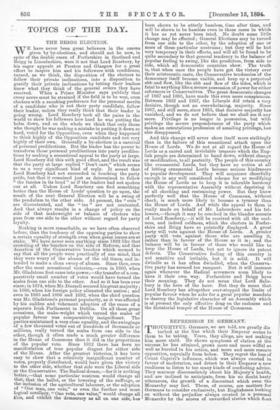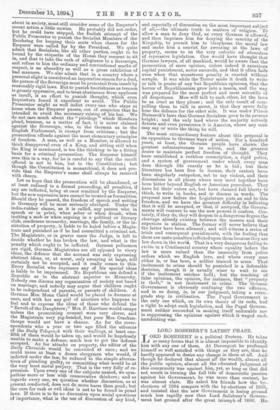REPRESSION IN GERMANY. about in society, must still consider some
of the Emperor's recent action a little unwise. He probably did not order, but he could have stopped, the foolish attempt of the Public Prosecutor to punish the Socialist Members of the Reichstag for keeping their seats when cheers for the Emperor were called fer by the President. We quite admit that Socialists, like all other parties, ought to be bound by the etiquette of the House they consent to sit in, and that to take the oath of allegiance to a Sovereign, and refuse to him the ordinary and conventional marks of respect, is an absurdity as well as a gross exhibition of bad manners. We also admit that in a country where a i personal slight s considered an imperative reason for a duel, the person of the Sovereign must be protected from insult by reasonably rigid laws. But to punish boorishness as treason is grossly oppressive, and to treat abstinence from applause as insult, Is an effort to punish thought, which even Inquisitors found it expedient to avoid. The Public Prosecutor might as well indict every one who stays at home when the Emperor passes, out of suspicion that he intended to avoid the necessary raising of his hat. We do not care much about the " privilege " which Members plead, because, as a matter of fact, it is never claimed against the Sovereign, who, in the German as in the English Parliament, is exempt from criticism ; but the prosecution offends against the most elementary principles of freedom. A man, as well as a Member, is allowed to think disapproval even of a King, and sitting still when the King is mentioned, is too like thinking to be a fitting basis for a criminal proseeution. The Emperor himself sees this in a way, for he is careful to say that the insult offered is not to him, but to the Constitution ; but though the Constitution is monarchical, it does not pro- vide that the Emperor's name shall always be received with cheers.
Let us hope that the prosecution will be abandoned, or at least .reduced to a formal proceeding, all penalties, if any are inflicted, being at once remitted by the Emperor, but the new repressive laws cannot be treated as formalities. Should they be passed, the freedom of speech and writing in Germany will be most seriously abridged. Under the india-rubber clause, as it is called, any person who in speech or in print, when sober or when drunk, when inciting a mob or -when arguing in a political or literary club, condemns monarchy, marriage, the family, or the in- stitution of property, is liable to be haled before a Magis- trate and punished as if he had committed a criminal act. The Magistrate, or in graver cases the Judge, is left to decide whether he has broken the law, and what is the penalty which ought to be inflicted. German policemen are rigid, German Magistrates are all opposed to viewy ideas, the defence that the accused was only expressing abstract ideas, or, at worst, only swearing at large, will certainly not be accepted, and it really comes to this. Every Socialist who expresses any of his special ideas is liable to be imprisoned. No Republican can defend a Republic as in the abstract superior to Monarchy. Nobody can discuss any organisation of society not based on marriage, and nobody may argue that children ought to be independent of parents, or parents of children. A German Mrs. Mona Caird would be placed in durance at once, and with her any girl of nineteen who happens to feel and to express the ideas of those .who defend the "Revolt of the Daughters ;" Mrs. F. Harrison would escape unless the prosecuting counsel were very clever, and the Magistrate very pig-headed, but poor Mrs. Crackan- thorpe would not have a chance. As for the corre- spondents who a year or two ago filled the columns of the Daily Telegraph with their evenings, at least one- fifth of them would be taken up, and would be hopelessly unable to make a defence, much less to get the defence accepted. As for attacks on property, the editor of the Daily Chronicle would be convicted at once ; and we could name at least a dozen clergymen who would, if indicted under the law, be reduced to the simple alterna- tives of pleading guilty, or committing what would be at the very least moral perjury. That is the very folly of re- pression. Upon every one of the subjects named, we sym- pathise more or less with conservative thinkers ; and as regards every one, we question whether discussion, as at present conducted, does not do more harm than good; but the cure for rash or evil ideas is not to be found in penal laws. If there is to be no discussion upon social questions of importance, what is the use of discussion of any kind, and especially of discussion on the most important subject of all,—the ultimate truth in matters of religion. To allow a man to deny God, as every German is allowed, and then imprison him for denying the sanctity of the Kingship, to permit him to blaspheme the moral law and make him a convict for swearing at the laws of property, seems to us the very reductio ad absurdum of repressive legislation. One would have thought that German lawyers, of all mankind, would be aware that the persecution of mere opinion, unless indeed it eanctions i capital punishment, never succeeds, and that t often faille even when that monstrous penalty is exacted without scruple. It was while the Terror made it death to write or talk in praise of any but Republican opinions, that the horror of Republicanism grew into a mania, and the way was prepared for the most perfect and most scientific of all despotisms. Men will talk to each other, let the laws be as cruel as they please ; and the only result of com- pelling them to talk in secret, is that they never fully hear the defence for the other side. It was under Prince Bismarck's laws that German Socialism grew to its present height ; and the only land where the majority actively detests and even persecutes it is America, where any man may say or write the thing he will.
. The most extraordinary feature about this proposal is its opposition to German ways of action. For a hundred years, at least, the German people have shown the greatest submissiveness in action, and the greatest desire to maintain perfect freedom of thought. They have established a ruthless conscription, a rigid police, and a system of government under which every man does through life exactly as he is bid ; but their literature has been free to license, their orators have been singularly outspoken, not to say violent, and their discussions in all places where men meet together have been bitter beyond English or American precedent. They have let their rulers act, but have claimed full liberty to think, to write in books, and to discuss in words. The proposal now before the Legislature puts an end to this freedom, and we have the greatest difficulty in believing that it will be accepted, or that, if accepted, the Govern- ments will venture to use the new powers it confers. Cer- tainly, if they do, they will deepen to a dangerous degree the cleavage already existing between the masses and their superiors in station. The former will never believe that the latter have been silenced ; and will witness a series of trials and consequent punishments, with the feeling that these are caste-penalties infl icted up on them because th ey are low down in the worla. That is a very dangerous feeling to excite in a Continental country where equality before the law is more valued than the immunity from police orders which we English love, and where every man either is, or has been, a soldier trained to arms. That incitement to crime should be punished is a defensible doctrine, though it is usually wiser to wait to see if the incitement catches hold; but the teaching of false opinions, the opinion, for instance, that "property.. is theft," is not incitement to crime. The German Government is obviously confusing the two offences, and in so doing, is, in our judgment, taking a retro-. grade step in civilisation. The Papal Government is . the only one which, on its own theory of its ends, had a right to adopt such legislation, and the Papal Govern- ment neither succeeded in making itself endurable nor in suppressiug the opinions against which it waged such. unrelenting war.









































 Previous page
Previous page